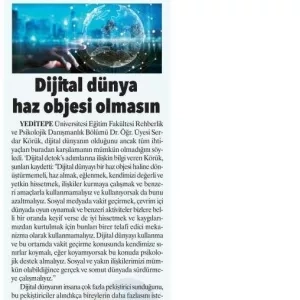Get Back in Balance with Digital Detox How to Build a Healthy Relationship with the Digital World?

The digital environment has rapidly and radically changed the way we interact and connect with the world and others. Especially in the last twenty years, the digital realm has become an integral part of the modern world and the functioning of daily life, continuing to gain importance. We try to adapt to this as quickly as possible, doing what we do best. However, according to experts, this adaptation comes with a significant side effect: dissociation, or a detachment from one's own reality.
Dr. Serdar Körük, a faculty member of the Guidance and Psychological Counseling Department at Yeditepe University's Faculty of Education, provided insights into the risks of the digital world and ways to establish a healthy relationship with it.
It Leads to Dissociation
Serdar Körük noted that with the development of technology, humanity has distanced itself from nature, concrete reality, face-to-face communication, traditional forms of relationships, and work habits in the last twenty years. "This, of course, creates some psychological and emotional complications. The process of dissociation, where an individual drifts away from their own reality, can begin," he said. Acknowledging the inevitable relationship with the digital world, Dr. Körük emphasized, "It's essential for this relationship to be a healthy one, and its foundation needs to be laid during childhood and adolescence. The digital world is an important need fulfiller for us, but it's impossible to meet all our needs as human beings through it. It's important not to forget this."
"Don't Turn the Digital World into an Object of Pleasure"
Serdar Körük listed the digital detox steps we can apply to return to our own reality and regain our balance as follows:
We should not transform the digital world into an object of pleasure, and should avoid using it for the sole purposes of enjoyment, entertainment, feeling valuable and competent, attempting to establish relationships, and similar aims. If we are using it for these reasons, we should reduce this usage.
Spending time on social media, playing online games, and engaging in similar activities may provide us with a certain amount of pleasure, but we should not use these as compensatory mechanisms to feel better and escape our anxieties.
We should set limits for ourselves regarding the use of the digital world and the time we spend in this environment. If we are unable to set these limits, we should seek psychological support. We should strive to maintain our social and close relationships as much as possible in the real and tangible world.
The digital world offers us many reinforcers, and as individuals receive these reinforcers, they desire more. Examples of such reinforcers can include receiving rewards in online gaming addiction, leveling up, or having a high profile. The reinforcers received in the digital world cannot replace those in real life. It's important to distinguish between the two. Otherwise, an individual may gradually develop two different perceptions of self. If an individual feels very social, successful, valuable, and of high status in the digital world but their real-world profile does not match this, it will lead to a division.
Engaging in regular sports activities, social and intellectual activities (cinema, theater, exhibitions, etc.), and academic/professional activities protects individuals from turning to the digital world because these activities provide real-world reinforcers.
Instead of avoiding the digital world, we should use it appropriately and for specific purposes. Use your free time for targeted activities instead of spending it on social media. For example, you could explore a travel page if it interests you.
We should use the digital world for acquiring knowledge, sharing information, learning, teaching, and other productive purposes.
Are the steps for adults and young adults different?
No, I do not think they are vastly different. As with all addictions, we see developmental progression from childhood to adolescence and from adolescence to adulthood in technology addiction derivatives as well. The number of adults addicted to online gaming is rapidly increasing today because these individuals have grown up with technology. Normally, an adult can regulate and control themselves better than a younger individual, but if this skill has not been developed in childhood and adolescence, it will be difficult to develop in later years.

